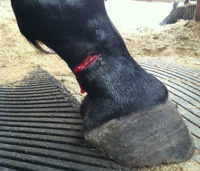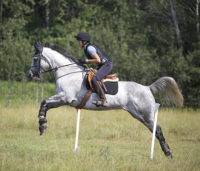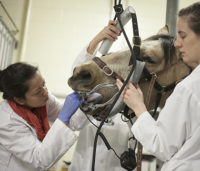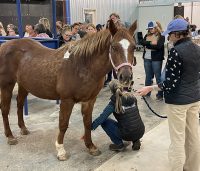Horse Health

-
Location key issue in assessing wounds
Horses can suffer from all types of wounds, and while some wounds look much worse than others, the primary assessment of their severity is the same as that of gauging housing prices: location, location, location. This claim is backed by Dr. Suzanne Mund, a master’s degree student in the Western College of Veterinary Medicine’s Department of Large Animal Clinical Sciences. …
January 12th, 2017 Full story »

-
What to do if you suspect colic
Most horse owners have their own personal stories to tell about colic — but chances are that everyone’s tales about the dreaded disease are different. Episodes of colic can range from a mild case of abdominal pain that resolves with pain medications to a life-threatening event that requires emergency surgical treatment. With such a variable condition, it can be difficult for …
December 12th, 2016 Full story »

-
Nerve blocks: working from the bottom up?
As the saying “no hoof, no horse” implies, the diagnosis and resolution of lameness is critical to a horse’s life. Unfortunately, it’s all too common to see a horse limping down the equine ward of the Western College of Veterinary Medicine’s (WCVM) Large Animal Clinic. When there are no obvious external lesions that could explain a horse’s lameness, flexion tests …
April 04th, 2016 Full story »

-
New tool homes in on equine lameness
Whether their patient is a high performance equine athlete or a beloved pony, veterinarians at the Western College of Veterinary Medicine (WCVM) have access to a full range of technologies that can help diagnose equine lameness and pinpoint problems. A new addition came in August 2015 when the college’s Veterinary Medical Centre acquired a Lameness Locator®, an advanced diagnostic tool …
October 16th, 2015 Full story »

-
Strategic deworming key for parasite control
Fall is here and it’s time to deworm your horse again — or is it? Traditional deworming protocols with a zero tolerance for any parasites may not be the best option for your horse, says Dr. Fernando Marqués, a board-certified specialist in large animal internal medicine at the Western College of Veterinary Medicine’s (WCVM) Veterinary Medical Centre. There’s no one-size-fits-all protocol …
October 08th, 2015 Full story »

-
Health management for performance horses
Much like humans, equine athletes performing at a high level can be at risk for certain conditions that cause poor performance. “Factors that make them athletes also predispose them to disease,” says Dr. Julia Montgomery, a specialist in large animal internal medicine at the Western College of Veterinary Medicine (WCVM). Horses have a very large heart with a low resting …
September 10th, 2015 Full story »

-
Regular dental checkups health investment
Everybody knows the importance of regular dental checkups when it comes to human health, so it should come as no surprise that horse health is just as dependent upon regular oral health checks. Dr. James Carmalt, a professor of equine surgery and a specialist in equine dentistry at the Western College of Veterinary Medicine (WCVM), recommends that horses receive routine …
August 03rd, 2015 Full story »

-
The foaling mare: preparation is key
If you ask anyone who has bred horses, they will tell you that it’s no easy feat. However, when it is done properly (and everything goes right), having an energetic and healthy foal is an exciting and rewarding experience. Dr. Stephen Manning is a board-certified theriogenologist and an associate professor at the Western College of Veterinary Medicine (WCVM). Based on …
July 08th, 2015 Full story »

-
Scratching the surface of equine skin diseases
If you have ever owned a horse with a skin disease, you know from experience that these conditions are frustrating to manage — diagnosing them can be difficult and their treatment is tedious. Worse yet, skin diseases can be painful for your horse if they cause irritation under tack or lameness. Dr. Michelle Husulak has seen her fair share of equine …
June 30th, 2015 Full story »

-
Equine infectious anemia threat for horses
Equine infectious anemia is a viral disease of horses, mules and donkeys that should be taken very seriously by owners, says a veterinary researcher. “When a horse is infected [with equine infectious anemia or EIA], it is infected for life,” says Dr. Sara Higgins. She’s a resident in large animal medicine at the Western College of Veterinary Medicine (WCVM) whose …
May 26th, 2015 Full story »

